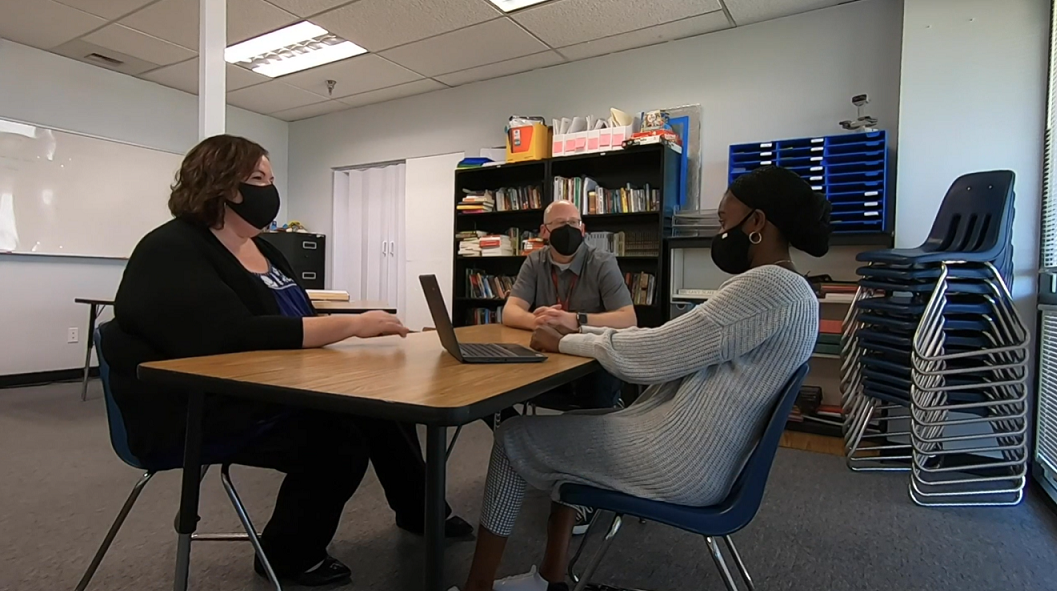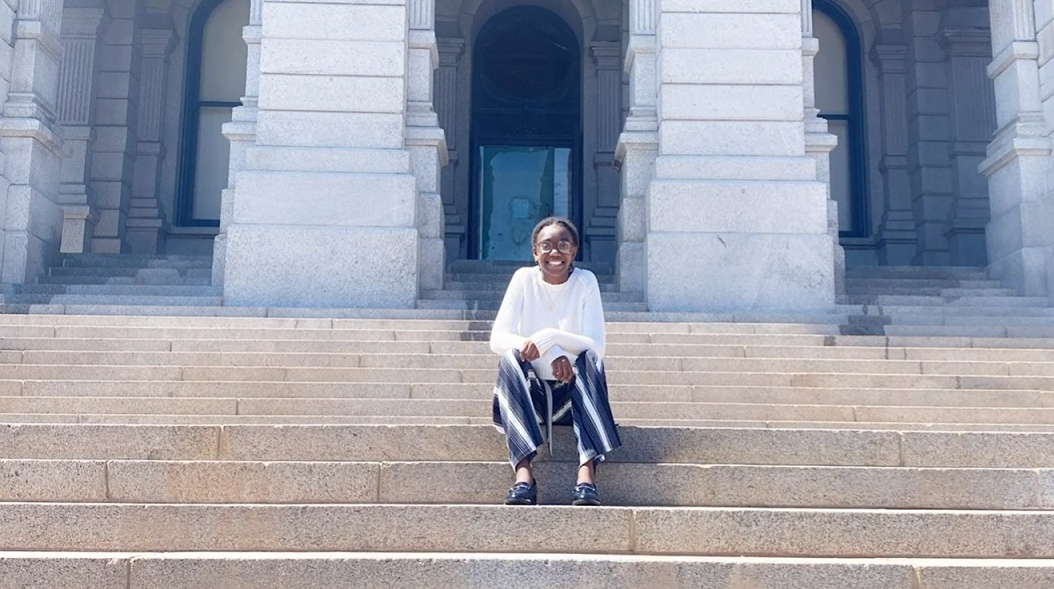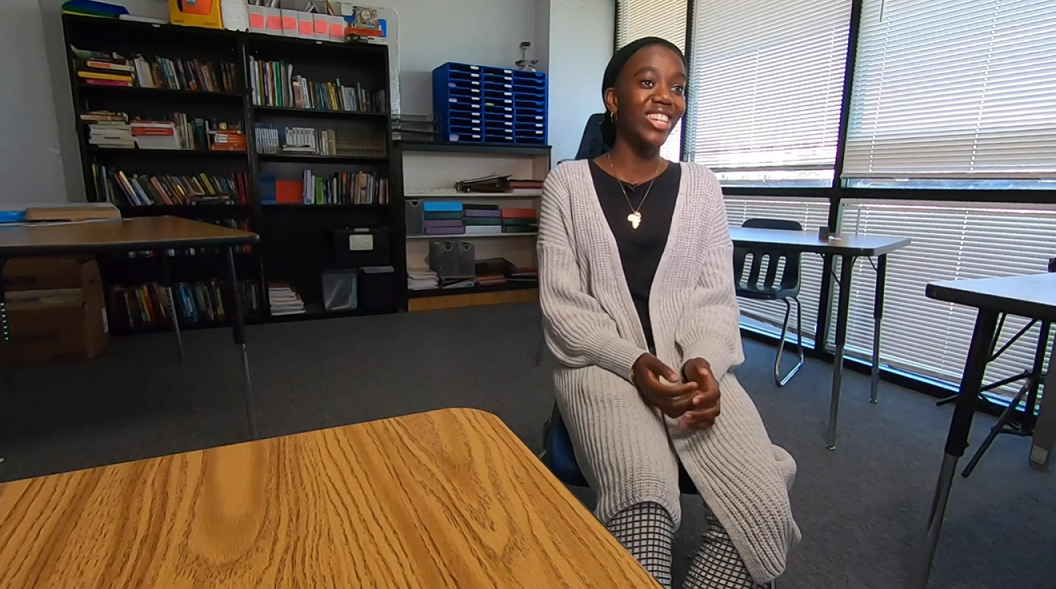‘We just need help': Aurora teen lends her voice to state plan providing free counseling for youth

AURORA, Colo. — Aku Unvu says she felt like she was going to fall off the edge.
The 18-year-old, soon-to-be graduate at APS Avenues in Aurora describes months of pandemic pressure adding up to a mental health crisis.
Unvu says she was taking both high school and college-level courses when the pandemic closed schools in the spring of 2020.
“It was constant work, around-the-clock work, trying to get assignments done, making sure that I'm on top of my grades,” she recalled to Rocky Mountain PBS.
Both of her parents had to go to work, so she found herself with extra responsibilities caring for her younger siblings. Then, she says the killing of George Floyd left her afraid to leave her home.
“I told myself, ‘If I can just make it to 18 without being a hashtag, I’m good. I’ve made it,’” Unvu said.

That fear, plus stress about school, applying to colleges, and the responsibility to help care for her family: it all combined and took a toll on her mental health.
“It was just all of those things at once and I really couldn't handle it. So it led to ... the suicidal thoughts... just me being in a really unhealthy place mentally,” Unvu said. "I realized that this is not something that I can fix on my own."
Unvu says she reached out to the team of mental health professionals at her school. She says she had other struggles with her mental health before the pandemic and already trusted the team.
All schools managed by the Aurora Public Schools district have at least two mental health providers, according to a district spokesperson. APS hired more than 100 new mental health professionals in the summer of 2019, funded largely by a mill levy approved by voters.
Unvu came to realize many students across the state may not have access to trusted mental health professionals in their school, as she did in her time of need, so she decided to speak out.
She and several other young people shared their personal stories while testifying at the state Capitol in April in support of the Rapid Mental Health Response for Colorado Youth legislation.

Using stimulus funds, the legislation creates a temporary youth behavioral health program in response to the pandemic that will give every school-aged child in the state the opportunity to undergo a mental health screening and potentially see a mental health professional for up to three no-cost sessions.
“Teens like me, especially in this day and age, we just need help, and we need somebody to talk to,” Unvu said. “There's a lot you can get done in three sessions. I got a lot done in three sessions.”
State Representative Dafna Michaelson Jenet (D-Commerce City) was one of the primary sponsors of the bill.
“We had been hearing from our kids that they were struggling intensely,” Rep. Michaelson Jenet told Rocky Mountain PBS. “I made a goal for myself that somehow, in some way, shape or form, we were going to get every kid in Colorado who wanted [it] to have access to therapy before they had to go back to school, so that they could have an intervention that would help them deal with their stress and anxiety.”
The bill passed on the final day of the session and awaits the signature of Governor Jared Polis. Legislative staff have estimated more than 25,000 youth could be supported by the program, which Michaelson Jenet hopes will launch in August.
Rep. Michaelson Jenet credited the young people who testified, including Unvu, for helping the bill gain broad support from lawmakers as it took its first critical first steps out of committee.
“It was because of the testimony of our youth. Nobody can tell their story the way they can tell their story,” she said. “It was exceptionally powerful.”
While the program passed as a temporary response to the COVID-19 pandemic, Michaelson Jenet said it will be studied as it is rolled out to determine if it should continue beyond 2022.
“I make no secret about the fact that I intend for this not to be a temporary program,” she said. “My hope is that study will be able to show us the value of continuing this program for the long term.”
The program is just one slice of Colorado's planned investment in behavioral health for people of all ages in response to the pandemic. In May, state officials said they would allocate $400-$550 million in federal rescue funds to mental health and behavioral health programs.

As for Unvu, she is set to graduate later this month and plans to head to college. She says she plans to stay in touch with her high school’s mental health professionals and continue pushing for more resources for young people.
“If we have more kids that are talking to people, we won't have school shootings, we won't have suicides. Those things would be at an all-time low, if we’re able to have these services available to all the youth,” she said. “I'm gonna keep fighting and advocating for people who need this.”
FAST FACTS ABOUT THE YOUTH MENTAL HEALTH RAPID RESPONSE PROGRAM:
- The bill passed earlier this month requires the state to find a vendor for the Rapid Mental Health Response for Colorado Youth program by August 1.
- The vendor will provide an online portal that will allow Coloradans 18 and younger to undergo an online "age appropriate" mental health screening.
- Young people whose screening results indicate they need additional support will be referred to see a mental health provider or receive substance use disorder services for up to three sessions. The providers will be reimbursed by the state for the sessions, which can either be conducted in person or using telehealth. Youth are not required to have insurance to participate, and those with insurance can be connected with providers who are covered in their network.
- The screening website is not available yet. The state’s Office of Behavioral Health is scheduled to provide RMPBS with more details about the plans for the program later this week. The state also plans a public awareness campaign for the program.
If you have an immediate mental health crisis, please call Colorado Crisis Services at 1-844-493-8255 or text TALK to 38255. Or call the National Suicide Prevention Lifeline at 1-800-273-8255. You can also chat with the Lifeline.
Brittany Freeman is the Executive Producer of Investigative Journalism at Rocky Mountain PBS. You can reach her at BrittanyFreeman@rmpbs.org.
Jennifer Castor is the Executive Producer of Multimedia Content at RMPBS and she can be reached at jennifercastor@rmpbs.org.
